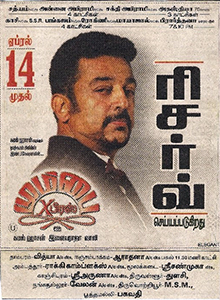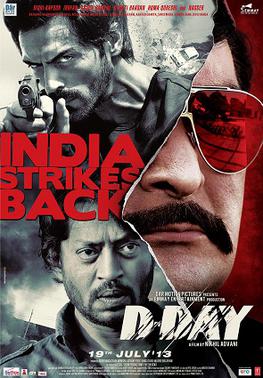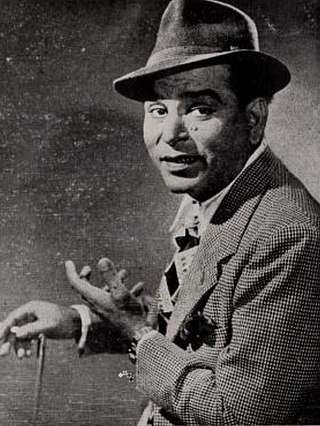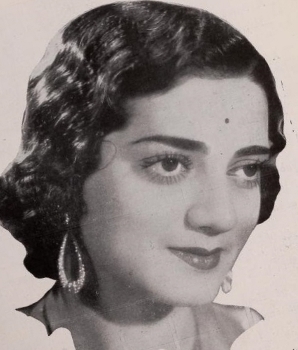
Pandit Pannalal Ghosh, also known as Amal Jyoti Ghosh, was an Indian flute (bansuri) player and composer. He was a disciple of Allauddin Khan, and is credited with popularizing the flute as a concert instrument in Hindustani classical music and also the "Pioneer of Indian Classical Flute".

Leela Chitnis was an Indian actress in the Indian film industry, active from the 1930s to the 1980s. In her early years she starred as a romantic lead, but she is best remembered for her later roles playing a virtuous and upright mother to leading stars.

Mumbai Xpress is a 2005 Indian black comedy film directed by Singeetam Srinivasa Rao and produced by Kamal Haasan. It stars Kamal Haasan himself in the lead role alongside Manisha Koirala. The music was composed by Ilaiyaraaja, while Siddharth Ramaswamy and Ashmith Kunder handled the cinematography and editing. The film is simultaneously shot in Tamil and Hindi.

Anil Krishna Biswas, professionally known as Anil Biswas, was an Indian film music director and playback singer from 1935 to 1965, who apart from being one of pioneers of playback singing, is also credited for the first Indian orchestra of twelve pieces and introducing orchestral music and full-blooded choral effects, into Indian cinema. A master in western symphonic music was known for the Indian classical or folk elements, especially Baul and Bhatiyali in his music. Out of his over 90 films, most memorable were, Roti (1942), Kismet (1943), Anokha Pyar (1948), Tarana (1951), Waaris (1954), Pardesi (1957) and Char Dil Char Rahen (1959).

Sri Ramadasu is 2006 Indian Telugu-language biographical film, based on the life of musician saint Kancharla Gopanna. A reboot of V. Nagayya's 1964 film Ramadasu; the film is written and directed by K. Raghavendra Rao. Produced by Konda Krishnam Raju the film starred Akkineni Nageswara Rao, Akkineni Nagarjuna, Suman, Sneha and music was composed by M. M. Keeravani. Cinematography and editing were handled by S. Gopal Reddy and Sreekar Prasad respectively. Upon release, the film got positive reviews.
Shashikala Saigal, better known by her first name, was an Indian film and television actress, who played supporting roles in hundreds of Bollywood films beginning in the 1940s.

Victoria No. 203 is a 1972 Indian Hindi-language heist comedy film produced and directed by Brij. The film stars Saira Banu, Navin Nischol, Ranjeet, Anwar Hussain and Helen. Ashok Kumar and Pran play key supporting roles and earned the Filmfare nominations for the film. The music by Kalyanji–Anandji and the roles of Ashok Kumar and Pran made this a "superhit" at the box office. The movie was remade in Telugu in 1974 as Andaru Dongale starring Shobhan Babu and Laxmi and in Tamil in 1974 as Vairam starring Jaishankar and Jayalalithaa. The 1995 Kannada movie Giddu Dada was also inspired by this movie. It was also remade in Bengali in 2005 as Chore Chore Mastuto Bhai. A Hindi remake of the film produced by Brij's son Kamal Sadanah was released in August 2007 with the same title. The climax of this movie went on to be reused in the 1994 cult classic comedy Andaz Apna Apna. Priyadarshan scripted Malayalam film Samrambham is also its remake.

Sasural Simar Ka is an Indian Hindi-language television soap opera produced by Rashmi Sharma Telefilms that aired from 25 April 2011 to 2 March 2018 on Colors TV. It stars Dipika Kakar Ibrahim, Avika Gor, Dheeraj Dhoopar, Shoaib Ibrahim, Manish Raisinghan, Vaishali Takkar, Varun Sharma, and Rohan Mehra. It is the second longest-running Indian television series on Colors TV after Balika Vadhu, which also featured Avika Gor.

D-Day is a 2013 Indian Hindi-language action thriller film co-produced by DAR Motion Pictures and Emmay Entertainment. The movie is directed by Nikhil Advani and stars Rishi Kapoor, Irrfan Khan, Arjun Rampal, Huma Qureshi and Shruti Haasan in prominent roles. The film was released on 19 July 2013 to generally positive reception.

Yakub Khan, known as Yakub, was an Indian actor born into a Pathan family in Jabalpur, Madhya Pradesh, India. He is best known for his comic and comic villainous roles.

Udaan (transl. Flight) is an Indian soap opera that premiered on Colors TV on 18 August 2014, replacing Madhubala. Produced by Mahesh Bhatt, it was originally conceived as a film but that plan was eventually shelved. Udaan is one of the longest running television shows of Colors TV The story revolves around Chakor, a victim of bonded child labour who fights for her village's freedom and aspires to break free. It starred Spandan Chaturvedi as a child version of Chakor until it took a generation leap in February 2016 & actress Meera Deosthale was roped in to play the role of an adult Chakor.
Manmohan is a 1936 Indian Urdu/Hindi-language romantic tragedy film directed by Mehboob Khan. This was Khan's third film for Sagar Movietone after Al Hilal (1935) and Deccan Queen (1936). The cinematographer was Faredoon Irani who, starting from Mehboob Khan's Al Hilal (1935), went on to establish a long working relationship with him lasting till Khan's last film Son of India (1962). The music was composed by Ashok Ghosh assisted by Anil Biswas. The story writer was Zia Sarhadi who also wrote the lyrics, screenplay and dialogue in addition to acting in the film. Though he had started his writing career on Khan's backing for Deccan Queen (1936), it was with Manmohan that he achieved success. The film was inspired by Devdas, (1935), which was a big hit at the box office. Surendra was chosen as the singing star to rival K. L. Saigal from New Theatres Calcutta, whose songs from Devdas had mesmerised the nation. Though Manmohan was referred to as the "poor man's Devdas" the film went on to do well and the songs became very popular. The film starred Bibbo, Surendra, Yakub, Kayam Ali, Bhudo Advani and Mehdi Raza.
Deccan Queen is a 1936 Hindustani action-adventure film directed by Mehboob Khan. It was the first "stunt" film from Sagar Movietone and the first film for actor Surendra, who was credited as "Surendra Nath B.A., L.L.B.". The film helped launch him as a singing star. This was the only action film directed by Mehboob Khan as he later shifted to films with social and political slant. This was Mehboob Khan's second directorial venture after Al Hilal (1935). He asked Zia Sarhadi then an unknown small-time actor, to write the screenplay, dialogue and songs for Deccan Queen. The music direction was by Pransukh Nayak along with Ashok Ghosh. The cinematographer was Faredoon Irani. The film starred Surendra, Aruna Devi, Ramchandra Pal and Kayam Ali.
Jagirdar (Landlord) is a 1937 Hindi romantic melodrama film directed by Mehboob Khan, and starring Bibbo, Motilal, Surendra, Yakub, Pande, Sankatha Prasad, Pesi Patel and Maya Banerjee.

Naseem Banu was an Indian actress. She was referred to as Naseem. Starting her acting career in the mid-1930s she continued to act till mid-1950s. Her first film was Khoon Ka Khoon (Hamlet) (1935) with Sohrab Modi under whose Minerva Movietone banner she acted for several years. Her high-point came with Modi's Pukar (1939) in which she played the role of Empress Nur Jahan. According to composer Naushad she got the sobriquet Pari-Chehra Naseem through the publicity advertisements of her films. She was the mother of actress Saira Banu and mother-in-law to the actor Dilip Kumar.

Baghban (Gardener) is a 1938 Hindi/Urdu family drama film directed by A. R. Kardar. The story was by Begum Ansari with script and screenplay by Kardar. Film's music was composed by Mushtaq Hussain with lyrics by Mirza Shauq. The cast included Nandrekar, Bimla Kumari, Nazir, Sitara Devi, K. N. Singh, Wasti and Ashraf Khan.

Bibbo was a music composer, singer and actress who worked in both Indian and Pakistani films. She acted in Indian cinema from 1931 to 1947 before moving to Pakistan, following Partition of India in 1947. She started her acting career with Ajanta Cinetone Ltd. in 1933, working with directors like M. D. Bhavnani and A. P. Kapoor. She was one of the top leading ladies of the 1930s along with actresses like Devika Rani, Durga Khote, Sulochana, Mehtab, Shanta Apte, Sabita Devi, Leela Desai and Naseem Banu. She was referred to as "one of the most important female stars of the 1930s and 1940s". Her fame had her featured in the lyrics of a popular song from the film Gharib Ke Lal (1939) sung by Mirza Musharraf and Kamla Karnataki, with music by Sagheer Asif and lyrics by Rafi Kashmiri. "Tujhe Bibbo Kahoon Ke Sulochana", where Sulochana referred to another popular actress of the time. This was the first time a song featuring famous actors was used in the lyrics of a film song.

Sabita Devi (1914–1965) was a Hindi film actress in Indian cinema. She is stated to be one of the "prominent" leading ladies of the "pioneering era" of Indian cinema along with Mehtab, Bibbo, Durga Khote, Gohar, Devika Rani and Seeta Devi. A Jewish by birth, she changed her name to find acceptability in Hindi cinema like the other Anglo-Indian and Jewish actresses of her time, Sulochana, Seeta Devi, Madhuri, and Manorama. After initially working with British Dominion Films Ltd., Calcutta, she shifted to Bombay and performed mainly in films produced by Sagar Movietone with her co-star in most films being Motilal. Some of the popular films with Motilal were Dr. Madhurika (1935) and Kulvadhu (1937) directed by Sarvottam Badami. Their first film together was Shaher Ka Jadoo (1934), which was also Motilal's debut film, and then Lagna Bandhan (1936) both directed by Kaliprasad Ghosh. She acted in Silver King (1935) with Motilal. It was an action film directed by C. M. Luhar, which became a "huge success".














